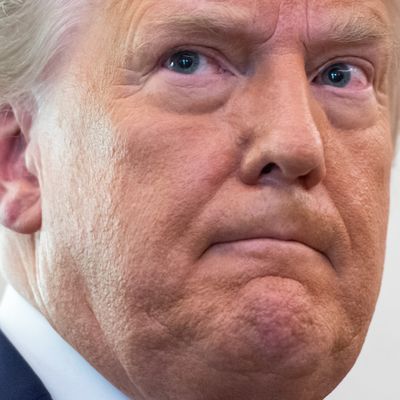
In September 2016, Michael Anton wrote an essay for the right-wing Claremont Institute, “The Flight 93 Election,” making the case for Donald Trump’s election as a necessary gamble to stave off the destruction of conservatism. Anton then did a stint in Trump’s National Security Council, and last night was rewarded by the president with a posting to the National Board for Education Sciences. It was a fitting coda for Trump to single out the figure who most perfectly captured the spirit that right-wing intellectuals brought to the era.
Anton’s case was notable, first, for its novelty. Before Trump won, “Never Trumpers” constituted the dominant strain of right-wing intellectual sentiment. Here was a prestigious organ of the intellectual right making a positive case for a nominee that the movement had dismissed as a clown and a surefire loser. Anton memorably seized the imagination of his audience by likening the choice to that faced by the passengers of Flight 93, who wrested control of the plane from Al Qaeda hijackers on 9/11. Allowing Hillary Clinton to win would mean certain death for conservatism, whereas electing Trump was risky — “you may die anyway” — but clearly preferable to certain death.
Anton’s argument was filled with dramatic rhetorical flourishes like this, and what little of it that was not non-falsifiable was demonstrably false. (According to Anton, “liberals took over criminal justice in the mid-’60s,” Democrats “treat open borders as the ‘absolute value,’” and Barack Obama engaged in “flagrant use of the IRS to torment political opponents.”)
Despite (or perhaps because of) these flaws, Anton articulated the bedrock principle that has driven the right the last four years: The Democratic Party is so terrifying and all-powerful that literally any measures, however unwise, are justifiable to block them from winning an election. That is the power of Anton’s chosen analogy, which urges his audience to overlook all of Trump’s complete unfitness to handle the job (“You — or the leader of your party — may make it into the cockpit and not know how to fly or land the plane,” he concedes) on the grounds that the alternative means imminent national death.
Consciously or not, Anton’s imagery seemed to lodge in the minds of the party elite. Again and again, officials tasked with preventing Trump’s erratic impulses from producing a disaster cast themselves in the position of emergency pilots. “I can land the plane,” promised Rod Rosenstein. “I’m landing the plane right now,” testified William Barr. Campaign manager Bill Stepien reportedly explained to the campaign staff their role, saddled with a candidate who refused to follow either social-distancing regulations or basic message discipline: “It’s our job to safely land the plane.” (“Safely” was of course a metaphor: In the literal sense, Trump’s packed and usually mask-free rallies were highly dangerous.)
Landing the plane was the dominant Republican metaphor of the Trump era. However unfit he may be, their task was to work within the parameters of a Trump-led government. Nothing he could do or say could override that calculation. The alternative was unthinkable.
America’s decidedly non-Burkean conservatism is marked, perhaps even defined, by an existential terror that the next liberal step will bring down civilization. Whether that step is the New Deal, ending de jure apartheid, the Great Society, Obamacare, gay marriage, energy-efficient lightbulbs, or what have you, catastrophe forever looms. Anton’s most logical argument was to insist that if conservatives’ apocalyptic claims were true, they had to act upon them. Otherwise, “you’ve implicitly accepted that your supposed political philosophy doesn’t matter and that civilization will carry on just fine under leftist tenets.” (I would suggest that this evidence implies the conservative worldview is not true — but then again, I’m not a conservative, and Anton did not give that possibility much consideration.)
In a bizarre way, Trump’s very unfitness only served to underscore the imperative to support him. “Only in a corrupt republic, in corrupt times, could a Trump rise,” reasoned Anton. “It is therefore puzzling that those most horrified by Trump are the least willing to consider the possibility that the republic is dying.” If Trump may be terrible, it shows how terrible the country is, and therefore how necessary it is to support him.
What Anton’s “Flight 93 Election” piece left mainly unstated was any argument over how Trump would save the country in any permanent way, rather than merely delaying the inevitable. Four years later, Anton was depicting the next Trump defeat as a prospect no less awful. Biden winning, he predicted, would either usher in “permanent one-party tyranny” or else “break the country.” Democrats, he warned before the election, were “openly talking about staging a coup.” The fact that it is Trump attempting something very much like a coup has not caused Anton to question his logic. It simply confirms it. Trump is merely doing to the Democrats what they would have done to him.
As singularly hysterical as it sounded four years ago, Anton’s reasoning has become the defining logic of this presidency in its waning days. Trump’s last project in office is to enlist as many Republicans as he can in his position that a Democratic election victory is inherently fraudulent, that no evidence is required to establish this, and any means that could theoretically nullify it are acceptable. That they concluded this even of an election of a moderate Democrat hobbled by at best slender majorities simply shows their commitment to the principle. No Democratic presidency, not even old Joe Biden begging Joe Manchin or Mitch McConnell for crumbs, can be tolerated. It turns out every election is a Flight 93 election.






























